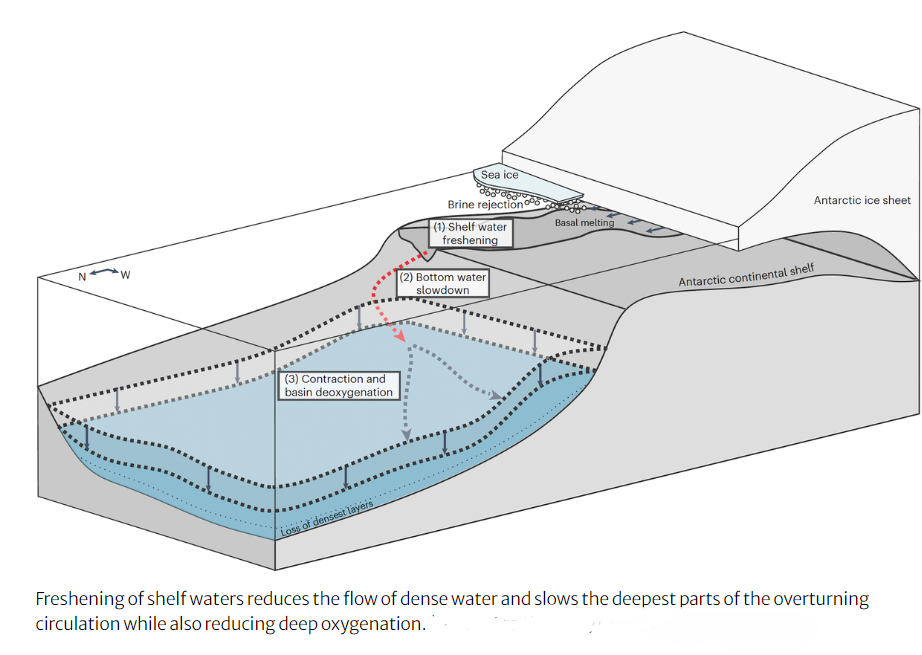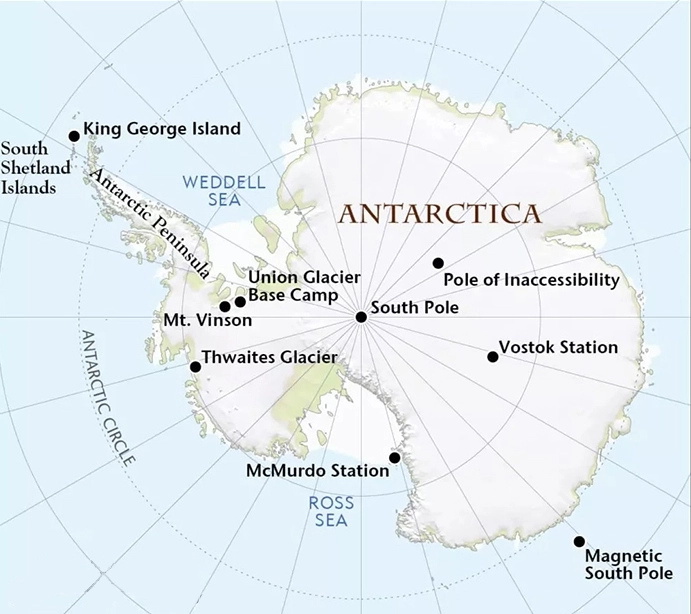Geography
The Slowdown in Overturning Circulation
- 30 May 2023
- 6 min read
For Prelims: Overturning circulation, Bottom Water, Antarctica, Greenhouse effect, ocean currents.
For Mains: Overturning circulation and its significance in maintaining climate stability, Slowdown in deep ocean currents in Antarctica and its consequences.
Why in News?
Recently, Deep Ocean currents in Antarctica are slowing down earlier than predicted, potentially disrupting the crucial overturning circulation.
- The slowdown in circulation and declining oxygen levels in the deep ocean have been observed, indicating significant changes in the Antarctic deep ocean over the past three decades.
- The consequences of this phenomenon are further underscored by the impacts of melting Antarctic ice on the overturning circulation.
What is Overturning Circulation?
- About:
- Overturning circulation refers to the global network of ocean currents that redistribute heat, carbon, and nutrients across the world's oceans.
- In Antarctica, it involves the sinking of dense, oxygen-rich water from the surface, its spread along the sea floor, and slow rise in distant regions.
- Process:
- In polar regions, the surface water cools due to low temperatures and exposure to frigid air masses.
- The cooling leads to the formation of sea ice, which extracts freshwater from the surrounding seawater. This process increases the salinity and density of the remaining water.
- The high salinity and density cause the surface water to become denser, making it more likely to sink.
- The dense water sinks to deeper layers, forming what is known as bottom water.
- The sinking of dense water drives the deeper limb of the overturning circulation. It flows towards the equator, while at the same time, warmer surface water from lower latitudes moves towards the poles.
- As the deep-water travels, it gradually mixes with surrounding water masses, exchanging heat, carbon, and nutrients. Eventually, the upwelling of this modified water occurs in other regions, completing the overturning circulation.
- Importance:
- Overturning circulation plays a crucial role in maintaining climate stability on Earth.
- It facilitates the transport of heat, carbon, and nutrients, influencing the planet's climate system.
- Additionally, it ensures the supply of oxygen to the deep ocean, supporting marine life and its ecosystems.
- Impact of Slowdown in Overturning Circulation:
- The observed slowdown of deep ocean currents in Antarctica, occurring earlier than anticipated, raises concerns about climate stability.
- A reduced flow of bottom water results in a decline in oxygen supply to the deep ocean, impacting oxygen-dependent organisms.
- Lower oxygen levels may lead to behavioral changes, migrations, and disruptions in the marine food chain.
- Moreover, the slowdown amplifies global warming as the ocean's capacity to store carbon dioxide and heat diminishes, intensifying the greenhouse effect.
- Melting Antarctic Ice and its Contribution:
- Melting Antarctic ice disrupts the formation of Antarctic bottom water, making surface waters fresher and less dense, impeding their sinking.
- This disruption weakens the overturning circulation, further diminishing the oxygen supply to the deep ocean.
- The replacement of bottom water with warmer, oxygen-depleted waters exacerbates the decline in oxygen levels.
- Additionally, melting ice contributes to rising sea levels through thermal expansion as warmer water occupies more space.
- Melting Antarctic ice disrupts the formation of Antarctic bottom water, making surface waters fresher and less dense, impeding their sinking.
What are the Key Highlights about Antarctica?
- Antarctica is uninhabited except for those manning the nearly 40 permanent stations established by several countries, including India, for carrying out scientific research.
- India maintains two research stations on the continent: ‘Maitri’ (commissioned in 1989) at Schirmacher Hills and ‘Bharati’ (2012) at Larsemann Hills.
- It has also launched 41 scientific expeditions every year thus far. Together with ‘Himadri’ station in Svalbard, above the Arctic circle, India is among an elite group of countries with multiple research in the polar regions.
- Antarctica is Earth's southernmost continent. It contains the geographic South Pole and is situated in the Antarctic region of the Southern Hemisphere.
- At 14,000,000 square kilometres, it is the fifth-largest continent.
- The Indian Antarctic Programme is a multi-disciplinary, multi-institutional programme under the control of the National Centre for Antarctic and Ocean Research, Ministry of Earth Sciences.
- India officially acceded to the Antarctic Treaty System in August 1983.
UPSC Civil Services Examination Previous Year Question (PYQ)
Q. How do ocean currents and water masses differ in their impacts on marine life and coastal environment? Give suitable examples. (2019)
Q. What are the forces that influence ocean currents? Describe their role in fishing industry of the world. (2022)







-min.jpg)